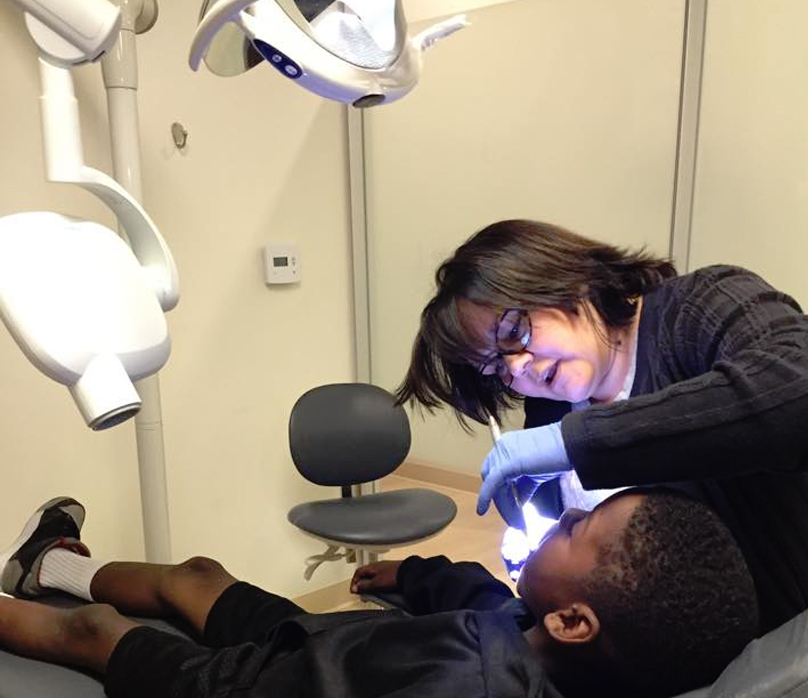Jefferson Park resident Bethany Solomon takes the Metro light-rail to work every day, waiting as much as 30 minutes at a time for a train that rarely shows up on schedule. Solomon, 42, says she does not have enough time to take care for her health or her children’s because she spends most of her days both at work and waiting at the Metro station. “I would have to set aside an entire day or even two if I wanted to pay a visit to a clinic or hospital to get checked out,” said Solomon. “There aren’t many around here, and the ones nearby have poor service, it’s really inconvenient.”
In 2015, the Los Angeles County Department of Public Health published a Community Health Assessment, which describes the health of Los Angeles County residents by presenting the complex web of factors that affect health. Because of its large size, the county has divided the region into eight geographic areas called Service Planning Areas (SPAs). The Service Planning area 6, or SPA 6, serves the communities of Athens, Compton, Crenshaw, Florence, Hyde Park, Jefferson Park, Lynwood, Paramount and Watts. There are five Emergency Medical Stations in the area per 100,000 persons, according to the assessment. The report also indicates that in L.A. County overall, 22 percent of adults between the ages of 18 and 64 are insured. In the SPA 6, 30 percent of adults are uninsured.
In May 2014, MetroHealth Station (MHS) emerged as a multispecialty private practice that offers primary medical, behavioral, dental and wellness services in one state-of-the-art-facility. Located on the northeast corner of Crenshaw and Jefferson Boulevard, MHS is just two blocks away from the nearest Metro stop.
Dr. Katherine J. Sullivan, an acclaimed expert in brain injury, founded MHS to provide innovative healthcare and wellness services to individuals who live and work in urban areas where few health and wellness providers are available. Concerned about studies that report the zip code where a person lives predicts the health of a child or a family, Dr. Sullivan challenged the notion and assembled a diverse group of health professionals, community stakeholders and government officials to transform healthcare in Los Angeles’ urban communities. “I believe ‘everyone deserves good health’ regardless of social status, age, gender, and cultural or sexual preferences,” said Sullivan. “My hope is to ‘flip the zip’ from zip codes that do not have enough healthcare resources to neighborhoods that have the people, places and services needed to care for the local residents.”
One out of four dental bays in the dental suite which also has a sedation room for individuals who need extra attention.
In the summer of 2014, Sullivan opened her first station in the neighborhood of Jefferson Park with the goal to serve 75,000 Angelenos in the Crenshaw District. Maya Hernandez, the community outreach coordinator of the Jefferson Park station, said the neighborhood was a great first location because it is a prominent example of a community in need of healthcare without much access to it. “Within the community there is not one establishment specifically built to improve people’s health,” said Hernandez. “We hope to expand our services to other neighborhoods because everyone needs and deserves a good health.”
Over the past two years, Dr. Sullivan and her team have established the first multispecialty facility for the Los Angeles County. Responsive to the health needs of the community it serves, MHS welcomes all patients – with or without insurance. Solomon, who is already covered under California’s Medi-Cal insurance program, said she had been anticipating the opening of the station’s door back in 2014. “I’m glad the neighborhood doesn’t have a lack of health facilities anymore,” said Solomon. “Plus, getting a check-up at the station is quick and convenient for people with busy schedules.” Convenience is Dr. Sullivan’s primary goal.
Source: MetroHealth Station website. A patient under a low-radiation-digital oral x-ray machine.
With the motto, “At one time, in one visit,” MHS intends to get rid of the burden that many people feel when having to pay a visit to the doctor. “Long waits at the doctor’s office discourage people from visiting a health center,” said Hernandez. Small, quick waiting rooms along with an efficient appointment system allow the station to treat patients in the shortest time possible. Hernandez said that MHS hopes to provide patients with a full check-up within 90 minutes. The services offered by the station are not like the ones found in everyday health clinics. MHS provides preventive health screens, physical therapy, dental examinations, body composition and fitness assessments as well as infant and child developmental assessments, among others.
Dr. Sullivan is not the first person to attempt to bring affordable and convenient healthcare centers to South Los Angeles communities. However, the demand for healthcare in the area continues to surpass the supply, and in order for the MetroHealth Station in Jefferson Park to continue to grow and connect with families and individuals in the neighborhood, Sullivan must build a strong partnership with community leaders. It has been a long journey for MHS and Dr. Sullivan. But, if the station continues to be successful, Sullivan and her team intend to set more of these stations along South Los Angeles.
“It is then our long-term goal to have MetroHealth Stations located next to Metro light-rail stops in South Los Angeles so that they can be easily accessible to people who are seeking healthcare,” said Hernandez.
